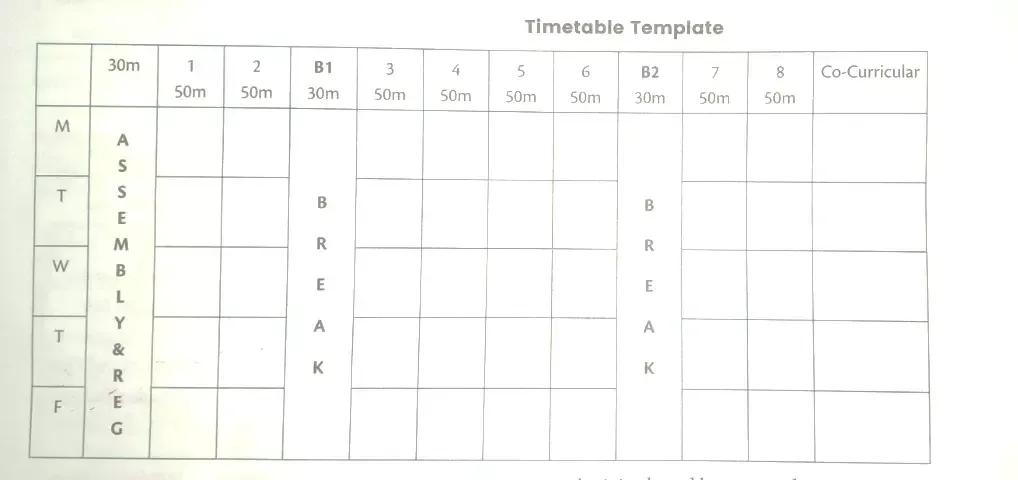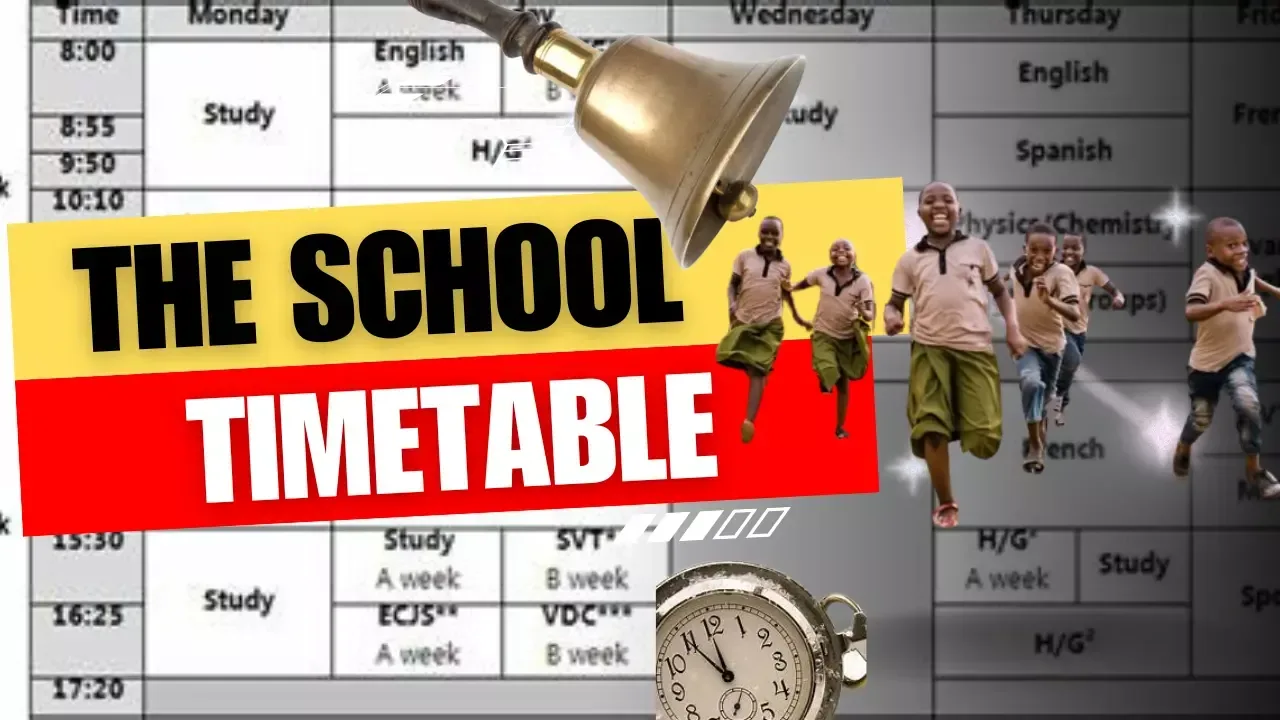🔔🔔Ding!!!! Dong!!!! Kran!!!! Kran!!!! 🔔🔔Do you still remember that special tinkling of your school’s bell, always followed by that small young boy’s voice: Break Over Please!!!!
Oh, the magic of that tinkling bell and the voice that nudged us back into the classroom. Just at that moment, the carefree break that my junior brother Dany Boy loved so much would quickly turn into a call to return to the world of lessons and learning. Come and see speed…….. “helter-skelter”, suddenly it is end of the road for all break time lovers😜😃
I’ve made you miss those day, right?……………. Such sweet nostalgia!”
But do you know who was actually behind all those? All those happened because a certain “Table” said so. What Table! “The Timetable”.
In our previous discussion, we considered the major difference between curricular activities and co-curricular activities. We found that one important component of the educational curriculum is the school timetable. In this post, we delve into the School Timetable.
What is the school timetable and how is it significant in the affairs of a school.
THE SCHOOL TIME TABLE
The School Time Table is a structured plan that outlines the day-to-day activities and events meant to be followed by each class within the school or the entire school. It is a suggested outline of day-to-day schedule of activities of a school or class.
The school timetable brings together subjects, teachers, classes, rooms and all school equipment in the best possible permutations. This means that the timetable helps to ensure effective combination of both human and material resources found in the school.
It is table for regulating and coordinating activities of the learners, teachers and the entire school. Timetables are “cyclical”. Activities on the timetable recur every week or every fortnight. Timetables with fortnight cycles usually are seen in schools with shift systems.
On a school’s timetable, you will find the time, duration, and the day when each subject or activity on the school’s curriculum is to be taught.

According to Wikipedia, “a school timetable is a calendar that coordinates students and teachers within the classrooms and time periods of the school day.”
In a typical Ghanaian school system, a Time Table Committee is set up to draw up the school-wide time table. In order to perform a diligent work, the committee needs to make some special considerations. They need to consult colleague teaches in the school, the academic calendar from Headquarters, and the syllabus for each subject.
They also need to consider extracurricular activities, availability and quantity of some facilities such as laboratory equipment, sports facilities and others.
They also need to consider the number of classes in the school, the total number of teachers within the school, the resources in the school; their types, number and availability.
One thing we must note is that, since the school timetable is suggested, it can be modified for “good reasons”.
WHAT ARE THE BENEFITS OF HAVING A SCHOOL TIMETABLE?
A timetable shows when specific events will happen in a class or school. It is a plan which shows at what times certain activities will happen.
Therefore, a timetable is very useful in planning ahead. Timetable tells the order in which events will take place.
The presence and effective use of the timetables ensure that there is proper and effective utilization of instructional time and school resources.
A school timetable is for managing school-related activities.
A School Time Table is used by students, teachers, rooms, and other resources. A school timetable usually cycles every week or every fortnight.
But how do we prepare school timetable? Let us find out.
FACTORS TO CONSIDER IN PREPARATION OF SCHOOL TIME TABLE
It is always important for designers to make some critical considerations when preparing a school’s timetable. This helps to ensure good timetable practices, smooth compliance by stakeholders, and to avoid unnecessary conflicts.
The following factors are considered when preparing a Time Table for a school in Ghana.
- GES regulations
- Age of the learners
- Allowance for modification (flexibility)
- Nature of Subjects (for examples, Mathematics and the Languages should be completed before lunch break)
- Co-Curricular Activities for the school
- Available Space
- Number of Teachers Available
- Conditions of the Locality Where the School is located
- Socio-cultural and Economic activities especially those that happen within the local community
- PLC should be allocated one of the slots for co-curricular activities.
Paying attention to these factors can help to ensure the right and approved subjects are captured, times and durations allotted lessons are appropriate for the respective age groups, teachers can make reasonable modifications when necessary, the right subjects are taught at the right times of the day and when needed materials will be are available etc.
In some communities in Ghana, some learners walk miles before they reach school. Arrangement must be made to shift normal class start time to a point that will such learners.

For effective running of a school, there must be a well prepared timetable in place. If the timetable is not well prepared with the necessary factors mentioned above, it has some negative consequences. It is very important for schools to develop and implement well-organized timetables in order to use it to support a positive and effective learning environment. Let us mention few of such potential consequences.
- Confusion about when and where classes are held. This can lead to a chaotic learning environment.
- Conflict in the allocation of classrooms, teaching and learning resources, and Teachers.
- Some subjects might receive more attention than others. When this happens, it can lead to curriculum imbalance and this can have a negative impact on the quality of education that learners receive.
- Without a well designed timetable, it may be quite difficult for teachers to track progress. Students on the other hand will become rather “irresponsible” in attending classes regularly.
- A school that lacks a well-designed timetables leaves room for parents to raise loud concerns about the level of commitment by the school in providing quality education. It makes parents and caregivers somehow dissatisfied.
Let us wrap up our exploration on the school timetable. We have delve into the important concepts that can help us face this weeks quiz with confidence and to stand better prepared for our Teacher Promotion exams ahead.
Get Ready to show how much you have learnt from this topic on the school timetable.
Best of luck! Don’t forget to share with your friends and colleagues.




